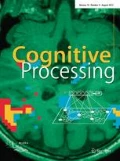Abstract
Hypotheses derived from models can be tested in an empirical study: If the model reliably fails to predict behavior, it can be dismissed or modified. Models can also be evaluated before data are collected: More useful models have a high level of empirical content (Popper in Logik der Forschung, Mohr Siebeck, Tübingen, 1934), i.e., they make precise predictions (degree of precision) for many events (level of universality). I apply these criteria to reflect on some critical aspects of Kirsch’s (Cognit Process, 2019. https://doi.org/10.1007/s10339-019-00904-3) unifying computational model of decision making.
Similar content being viewed by others
Notes
I thank the reviewer who made me aware of this work.
I use the terms theory and model interchangeably but see, in contrast, Thagard (2012, Chapter 1) for a differentiation.
See also Glöckner and Betsch (2011) for a recent application of these criteria for evaluating models in judgment and decision making.
References
Dennet DC (1981) Brainstorms: philosophical essays on mind and psychology. The MIT Press, Cambridge
Farrell S, Lewandowsky S (2010) Computational models as aids to better reasoning in psychology. Curr Dir Psychol Sci 19:329–335
Festinger L (1957) A theory of cognitive dissonance. Row, Peterson, Evanston
Fiedler K (2004) Tools, toys, truisms, and theories: some thoughts on the creative cycle of theory formation. Personal Soc Psychol Rev 8:123–131
Fiske ST (2004) Mind the gap: in praise of informal sources of formal theory. Personal Soc Psychol Rev 8:132–137
Gigerenzer G, Goldstein DG (1996) Reasoning the fast and frugal way: models of bounded rationality. Psychol Rev 103:650–669
Gigerenzer G, Todd PM (1999) Simple heuristics that make us smart. University Press, Oxford
Glöckner A, Betsch T (2011) The empirical content of theories in judgment and decision making: shortcomings and remedies. Judgm Decis Mak 6:711–721
Glöckner A, Hilbig BE, Jekel M (2014) What is adaptive about adaptive decision making? A parallel constraint satisfaction account. Cognition 133:641–666
Higgins ET (2004) Making a theory useful: lessons handed down. Personal Soc Psychol Rev 8:138–145
Kahneman D, Tversky A (1979) Prospect theory: an analysis of decision under risk. Econometrica 47:263–292
Kirsch A (2019) A unifying computational model of decision making. Cognit Process. https://doi.org/10.1007/s10339-019-00904-3
Klein S (2014) What can recent replication failures tell us about the theoretical commitments of psychology? Theory Psychol 24:326–338
Krajbich I, Armel C, Rangel A (2010) Visual fixations and the computation and comparison of value in simple choice. Nat Neurosci 13:1292–1300
Marewski JN, Olsson H (2009) Beyond the null ritual: formal modeling of psychological processes. J Psychol 217:49–60
Myung IJ, Pitt MA (1997) Applying Occam’s razor in modeling cognition: a Bayesian approach. Psychon Bull Rev 4:79–95
Myung IJ, Navarro DJ, Pitt MA (2006) Model selection by normalized maximum likelihood. J Math Psychol 50:167–179
Pitt MA, Myung IJ (2000) When a good fit can be bad. Trends Cognit Sci 6:421–425
Pitt MA, Myung IJ, Zhang S (2002) Towards a method for selecting among computational models for cognition. Psychol Rev 109:472–491
Platt JR (1964) Strong inference. Science 146:347–353
Popper KR (1934/2005) Logik der Forschung, 11th edn. Mohr Siebeck, Tübingen
Rieskamp J, Otto PE (2006) SSL: a theory of how people learn to select strategies. J Exp Psychol General 135:207–236
Roberts S, Pashler H (2000) How persuasive is a good fit? A comment on theory testing. Psychol Rev 107:358–367
Ross D (2019) Empiricism, sciences, and engineering: cognitive science as a zone of integration. Cogn Process. https://doi.org/10.1007/s10339-019-00916-z
Shultz TR, Lepper MR (1996) Cognitive dissonance reduction as constraint satisfaction. Psychol Rev 103:219–240
Thagard P (2012) The cognitive science of science: explanation, discovery, and conceptual change. The MIT Press, Cambridge
Van Lange PA, Kruglanksi AW, Higgins ET (2012) Theories of social psychology: an introduction. In: Van Lange PA, Kruglanksi AW, Higgins ET (eds) Handbook of theories of social psychology. Sage, London, pp 1–8
Vanpaemel W, Lee MD (2012) Using priors to formalize theory: optimal attention and the generalized context model. Psychon Bull Rev 19:1047–1056
Author information
Authors and Affiliations
Corresponding author
Ethics declarations
Conflict of interest
The author declares that he has no conflict of interest.
Human and animal rights statements
This article does not contain any studies with human participants or animals performed by the author.
Additional information
Publisher's Note
Springer Nature remains neutral with regard to jurisdictional claims in published maps and institutional affiliations.
Rights and permissions
About this article
Cite this article
Jekel, M. Empirical content as a criterion for evaluating models. Cogn Process 20, 273–275 (2019). https://doi.org/10.1007/s10339-019-00913-2
Received:
Accepted:
Published:
Issue Date:
DOI: https://doi.org/10.1007/s10339-019-00913-2


